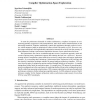Free Online Productivity Tools
i2Speak
i2Symbol
i2OCR
iTex2Img
iWeb2Print
iWeb2Shot
i2Type
iPdf2Split
iPdf2Merge
i2Bopomofo
i2Arabic
i2Style
i2Image
i2PDF
iLatex2Rtf
Sci2ools
122
click to vote
CGO
2003
IEEE
2003
IEEE
Compiler Optimization-Space Exploration
To meet the performance demands of modern architectures, compilers incorporate an everincreasing number of aggressive code transformations. Since most of these transformations are not universally beneficial, compilers traditionally control their application through predictive heuristics, which attempt to judge an optimization’s effect on final code quality a priori. However, complex target architectures and unpredictable optimization interactions severely limit the accuracy of these judgments, leading to performance degradation because of poor optimization decisions. This performance loss can be avoided through the iterative compilation approach, which advocates exploring many optimization options and selecting the best one a posteriori. However, existing iterative compilation systems suffer from excessive compile times and narrow application domains. By overcoming these limitations, Optimization-Space Exploration (OSE) becomes the first iterative compilation technique suitable f...
CGO 2003 | Iterative Compilation | Optimization Options | Software Engineering | first Iterative Compilation |
Related Content
| Added | 04 Jul 2010 |
| Updated | 04 Jul 2010 |
| Type | Conference |
| Year | 2003 |
| Where | CGO |
| Authors | Spyridon Triantafyllis, Manish Vachharajani, Neil Vachharajani, David I. August |
Comments (0)

